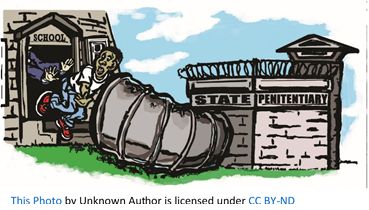
Shutting Down the School-to-Prison Pipeline
The Maryland Commission on School to Prison Pipeline and Restorative Justice Practices met on September 17, and MAJR Monitor Pat Marks, who has been attending their meetings regularly, brings us this report.
In the 2017 Maryland Legislative Session, under the leadership of Delegate Alonzo Washington, (D-P.G.) House Bill 1287 was enacted to create a Commission on the School-to-Prison Pipeline and Restorative Practices. The Commission is charged with studying discipline practices in Maryland public schools; focusing on Maryland data indicative of the School-to-Prison Pipeline; and examining best practices for implementation and training in restorative practices to eliminate the disproportionate treatment of students, with a focus on engaging parents. The work will culminate in recommendations on the establishment of a Collaborative Action Plan to redesign public school discipline practices.
At the September 17, 2018 meeting of the Commission on the School-to-Prison Pipeline and Restorative Practices, the group reviewed the current draft of the report due on December 31, 2018 and heard presentations about current restorative practices in three county school systems: Anne Arundel, Montgomery, and Howard.
Draft Recommendations
Recommendations in the current draft of the report are linked closely to the topic areas to be addressed by the Maryland Commission on Innovation and Excellence in Education (also known as the Kirwan Commission), which issued its Preliminary Report in January of this year. The current draft of recommendations makes the following legislative recommendation:
In addition to recommendations linked to the Kirwan Report, this Commission recommends that The Maryland State Department of Education (MSDE) direct the Local Education Agencies (LEAs) to develop a 5-year plan for making progress in the implementation of restorative practices. This will allow each LEA to select approaches appropriate to their community and even support varied implementation approaches within different schools. The expectation is that over 5 years schools will make progress toward implementation. Given that there is no clearly defined funding source, it is unrealistic to expect all school systems to achieve mastery within 5 years; but with support from MSDE, strong progress is expected.
Additionally, the Commission recommends:
- Recommend additional data collection, transparency, and disaggregation on school discipline, possibly incorporating sections of HB 1254 (passed in 2018) that were deleted from the bill:
- Recommend that Maryland require schools/districts to collect data on infractions and disciplinary consequences by student referred for discipline.
- Recommend that MSDE develop a data collection system to track Office Referrals that includes a written reason/description for a referral to the office and includes the referring teacher.
- Recommend an analysis of the relationship between exclusionary discipline practices and student outcomes be conducted by an independent researcher/organization.
- Recommend an independent study/evaluation be conducted of the training, implementation, and impact of restorative practices in Maryland public schools.
- Recommend that MSDE develop guidelines on the design and implementation of Restorative Practices that include core concepts and principles for district that can be used when developing local programs.
- Recommend that these guidelines include information on resources on Restorative Practices, reputable professional development trainers, etc.
- Recommend that MSDE lower the risk ratio from 3.0 to 2.0 for identifying a school as “high suspending”.
- Recommend that MSDE also include a measure of suspension rate as a measure of high suspending schools.
Counties Report on Restorative Justice Practices
Three local school systems reported on their restorative justice practices.
Anne Arundel has implemented a county wide program which is implemented in 57 schools: 5 of 12 high schools; 15 of 20 middle schools; 35 of 79 elementary schools; and both alternative schools. They are currently conducting a strategic plan for the next five years which focuses on relationship building. The implement is done on three levels: prevention, intervention, and restoration. Only schools that offer Positive Behavioral Intervention & Supports (PBIS) are involved because the implementation of restorative justice practices builds on the structures (including referrals) already in place.
Montgomery County Public Schools offers a menu of services provided by staff who are funded by a $1.2 million grant from Rand and the National Institute of Justice. The focus in currently on middle schools. The materials state that MCPS will prepare and equip its staff, students, parents, and the surrounding community with skills and resources necessary to navigate healthy relationships with self and others through meaningful trainings, differentiated school-level support, collegial collaboration and supported community partnerships.
Howard County has conducted trainings on Peace Circles over the summer in four schools: 2 middle, 1 elementary, 1 high. Each of the four schools is implementing restorative justice processes differently in each. Trainings included School Resource Officers and other personnel in addition to teachers.














